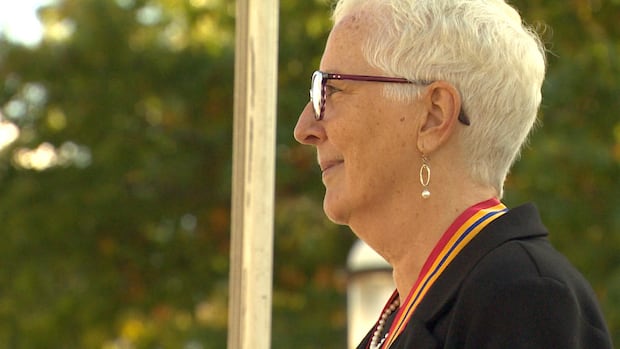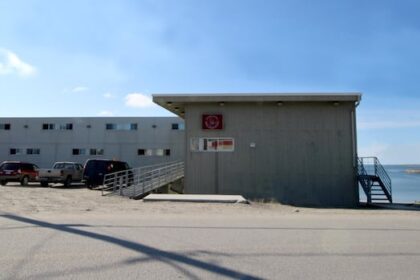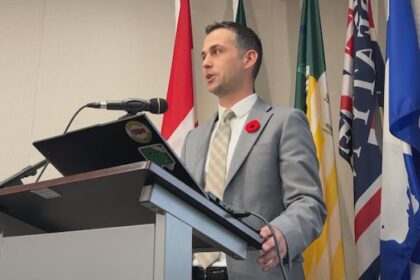New Brunswick·NewCanada’s top court spent Thursday grappling with whether the Constitution requires New Brunswick’s lieutenant-governor to be bilingual — and what will happen if the answer turns out to be yes.Supreme Court weighs arguments on whether Brenda Murphy’s 2019 appointment was unconstitutional Jacques Poitras · CBC News · Posted: Nov 13, 2025 3:11 PM EST | Last Updated: 19 minutes agoListen to this articleEstimated 4 minutesThe audio version of this article is generated by text-to-speech, a technology based on artificial intelligence.The Acadian Society of New Brunswick says the 2019 appointment of Brenda Murphy as lieutenant-governor violated language-equality provisions of the Charter of Rights and Freedoms. (New Brunswick Legislature)Canada’s top court spent Thursday grappling with whether the Constitution requires New Brunswick’s lieutenant-governor to be bilingual — and what will happen if the answer turns out to be yes.Lawyers for the Acadian Society of New Brunswick argued that the position is subject to language-equality provisions of the Charter of Rights and Freedoms, and that the 2019 appointment of Brenda Murphy violated those guarantees.“The lieutenant-governor personifies the state,” lawyer Gabriel Poliquin told the nine justices of the Supreme Court of Canada.The court did not rule Thursday and did not give a date on when it would make its decision.Comments and questions from several of the justices, including Chief Justice Richard Wagner, suggested they were open to the Acadian society’s argument.Gabriel Poliquin, a lawyer for the Acadian Society of New Brunswick, argued the lieutenant-governor should be bilingual. (Screenshot from Supreme Court of Canada livestream)“It’s a bit ironic that the only bilingual province in Canada has at its head a person who is unilingual,” he said, adding the circumstances were “surprising.”The society launched the lawsuit after Prime Minister Justin Trudeau appointed Murphy, who was unilingual, to the position in 2019.Federal lawyer Lindy Rouillard-Labbé said the institution was complying with the Charter. (Screenshot from Supreme Court of Canada livestream)Court of King’s Bench Chief Justice Tracey DeWare ruled in 2022 that the choice was unconstitutional. The New Brunswick Court of Appeal overturned that in 2024.Murphy’s term ended earlier this year, and her replacement, Louise Imbeault, speaks French and English fluently.The Charter requires the New Brunswick Legislature and government to function bilingually and to offer services to the public in both English and French, but that obligation doesn’t extend to every provincial employee.Instead, it’s the institution as a whole that must provide bilingual service, not individuals.The federal government argued Thursday that the same logic extends to the lieutenant-governor, who has a support staff that can communicate in both languages.Federal lawyer Lindy Rouillard-Labbé said the institution was complying with the Charter.But the society said the lieutenant-governor’s role is unique, because no one else can perform her functions, such as signing bills into law, approving cabinet decisions or dissolving the legislature for an election.Many of the justices’ questions turned on that point.Justice Michelle O’Bonsawin asked what would happen if a unilingual francophone premier of New Brunswick went to see a unilingual anglophone lieutenant-governor to ask for the legislature to be dissolved for an election.“How will they understand each other?” she asked. “They’re unilingual, but they speak different languages, and that’s a function the lieutenant-governor can’t delegate.” Justice Malcolm Rowe questioned Poliquin’s argument that Murphy’s appointment was a symbolic rebuke. (Screenshot from Supreme Court of Canada livestream)Rouillard-Labbé said it was “possible to imagine different hypotheticals,” but the real question was whether the cabinet order appointing Murphy violated the Charter.She argued it was not.Other justices pushed back at the Acadian Society’s case.Justice Malcolm Rowe questioned Poliquin’s argument that Murphy’s appointment was a symbolic rebuke to francophones because it showed a lack of respect.“Is your submission also pertinent to the position of premier of New Brunswick?” he asked, pointing out that former premier Blaine Higgs did not speak French either.“It’s a question of dignity, it’s a question of symbolism, it’s a question of the acceptance of the two languages. … If the premier is unilingual, isn’t that unconstitutional as well?” Poliquin responded that the principle applied in different ways to different positions, because the lieutenant-governor’s main role is to represent the state and the premier’s position is elected.When Rowe pressed the point, Wagner cut in: “The lieutenant-governor’s role is linked to the individual. The premier, it’s a government. It’s very different.” The court also heard arguments on what may happen if it rules that Murphy’s appointment was unconstitutional and should be overturned.’The lieutenant-governor’s role is linked to the individual. The premier, it’s a government. It’s very different,’ said Justice Malcolm Rowe. (Screenshot from Supreme Court of Canada livestream)Lawyers for the New Brunswick government say this could create legal chaos by invalidating every law, cabinet order and appointment that Murphy signed during her five years in the position.Justice Nicholas Kasirer asked the society if the court could instead simply issue a legal declaration that people appointed in the future must be bilingual, without invalidating Murphy’s selection and all her actions.Another Acadian society lawyer, Érik Labelle Eastaugh, argued against that.He said the court should invalidate the appointment but could suspend the effect of its ruling long enough for the legislature to pass omnibus legislation to re-adopt and restore everything Murphy did, this time with Imbeault signing off in the position. ABOUT THE AUTHORJacques Poitras has been CBC’s provincial affairs reporter in New Brunswick since 2000. He grew up in Moncton and covered Parliament in Ottawa for the New Brunswick Telegraph-Journal. He has reported on every New Brunswick election since 1995 and won awards from the Radio Television Digital News Association, the National Newspaper Awards and Amnesty International. He is also the author of five non-fiction books about New Brunswick politics and history.
Ironic that N.B. had unilingual lieutenant-governor, chief justice says











